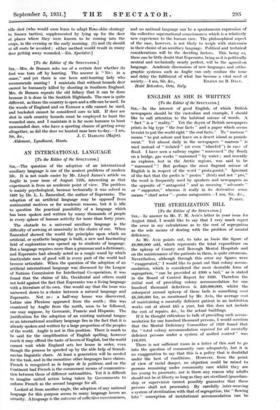ENGLISH AS SHE IS WRITTEN
[To the Editor of the SPECTATOR.]
SIR,—In the interest of good English, of which British newspapers should be the custodian and example, I should like to call attention to the habitual misuse of words. A " fact " is a `` reality." Yet the doyen of British newspapers prints in big type " the true facts" and a paper which seems to exist to.put the world right " the real facts." To " maroon " means " to put ashore and leave on a desert island as punish- ment." Yet almost daily in the newspapers " maroon " is used instead of " isolated " (or even " islanded ") in case of flood. I have seen a railway engine " marooned " (by flood) on a bridge, gas works " marooned " by water ; and recently an explorer, lost in the Arctic regions, was said to be " marooned " 1 But perhaps the most flagrant misuse of English is in respect of the word " prota gonist." Ignorant of the fact that the prefix is " protos " (first) and not " pro," the word is frequently used by speakers, and newspapers as the opposite of " antagonist " and as meaning " advocate " or " supporter," whereas it really in its derivative sense means " chief actor "—profos antagonistes.—I am, Sir, &c.,
PURIST.






























 Previous page
Previous page